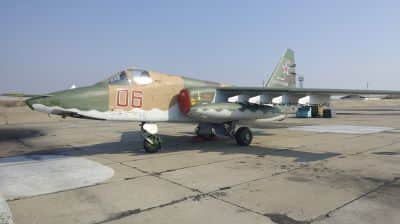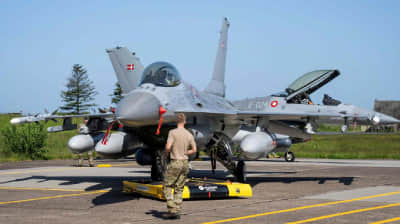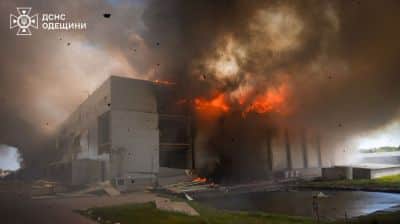Hello, Belarusian knitwear, goodbye, villas in Italy: economic front outcomes as of 5 March
SATURDAY, MARCH 5, 2022, 22:24 - YAROSLAV VINOKUROV
"Ordinary Russians" have been left without consoles, but also without computers, games, and clothing brands.
According to the International Monetary Fund, the war that Russia has treacherously launched against Ukraine will have dire consequences for the world economy. The consequences will be terrible, disproportionately affecting poorer countries, raising food and energy prices.
Inflation, which was already rampant in the world before the war, will accelerate with renewed vigour because of Russian aggression. Central banks will have to tighten monetary policy much sooner, slowing down the world economy.
Of course, it is Ukraine's economy that will suffer the most from the war. According to preliminary estimates by the National Bank, Ukrainian GDP is now about half of what it was before the war. Russia's economy, in turn, risks contracting by 7%, even though infrastructure, buildings, strategic networks and so on are not being shelled or blown up on its territory.
Day by day, Russia is becoming "more and more like North Korea," completely closed to the world and put on the brink of survival by its own dictatorial leadership.
Previously
Leading IT companies and computer equipment manufacturers have announced a mass exodus from Russia. Microsoft, AMD, Intel will stop supplying Russia with high-tech hardware and software. The aggressor country is steadily moving closer to the Stone Age.
This movement is being accelerated by Russia itself, cutting off its citizens from global social networks and limiting opportunities to buy currencies or wire the funds.
A new day, a new Russian isolation
Tech-front
Tech companies are continuing to sever all economic ties with the aggressor. In particular, Samsung has completely stopped supplying its chips, smartphones and even home appliances to Russia.
According to Counterpoint, a think-tank, Samsung Electronics is the largest phone seller in Russia with a market share of 30% in the fourth quarter of 2021, ahead of Xiaomi with 23% and Apple with 13%.
Technology giant IBM has also suspended its relations with Russia. The company will no longer sell any technology to the aggressor country.
Adobe has angered the Russian creative sector. Now Russia is left without Photoshop, Premiere, Illustrator, Lightroom: the sale of new licences has been stopped.
Russian IT specialists, who thought that sanctions would not affect them because they still work for foreign clients, are also out of luck. Most likely, they will not be able to get paid for their work. Payoneer payment system, which is often used to pay for outsourcing services, is leaving Russia.
"We have decided to suspend access to Payoneer's services to new customers in Russia and to complete our commitments with our current global partners and customers operating in Russia in accordance with the terms of the agreement. We cannot, with a clear conscience, support an aggressive government that is violating decades of peace in Europe," the company said.
PayPal and Revolut are not working in Russia either. The latter has severed its ties not only with Russian but also with Belarusian users.
The Russians have not only been deprived of access to software, but also know-how. Coursera, one of the world’s leading online education systems, has suspended its dealings in Russia, and content from Russian users will no longer be available on the platform. Preply, the tutor work organisation platform, and Storytel, the audiobook streaming service, have followed the same path.
People will no longer be able to play computer games in their spare time either. Major video game makers EA and Activision Blizzard have announced that they will stop future sales of their products in Russia due to its armed aggression against Ukraine. They were joined by Rockstar, a GTA Games developer, and Boosteroid, a cloud gaming platform.
Business front
Moody's rating agency, the Henkel Group, eBay, IT company Luxoft, DXC Technology Company, and one of the largest backbone providers Cogent, announced their withdrawal from the Russian market or termination of economic relations with Russia on 5 March, and decided to unplug Russian users.
Russians will no longer be able to watch the games of the French Football Championship while drinking Heineken beer.
Instead of expensive brand-name clothes from Louis Vuitton, Hermes, Chanel, Gucci, Balenciaga and Yves Saint Laurent, less expensive Massimo Dutti, Zara, Bershka, Pull & Bear, Stradivarius, Oysho, Uterque or even PUMA sportswear, residents of the aggressor country should become accustomed to wearing kosovorotkas (Russian national shirts) or hope for the salvation of "Belarusian knitwear".
All branded stores in Russia will close, and even the richest Russians will no longer be able to fly abroad to buy clothes: the skies over Europe are closed, and Russian airlines refuse to fly even to countries that have not closed their skies: they are afraid of being arrested.
People close to the Russian dictator have nowhere else to fly: the West is sequestrating their yachts and villas. So cursing the "rotten West'' from a villa on the shores of Lake Como in Italy is no longer an option.
The withdrawal of Western business from Russia has become so widespread that it threatens to make 3 million Russians jobless already. However, it may get much worse. Especially if Russia loses its oil and gas markets.
Every day of the war brings Russia closer to an energy embargo. For example, Germany, which is traditionally friendly to Russian gas, has already considered building an LNG terminal to abandon Russian gas, while the United States wants to abandon Russian oil.







